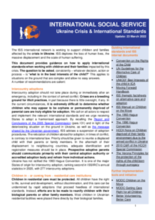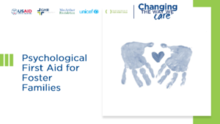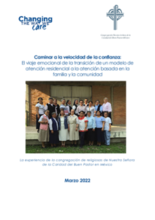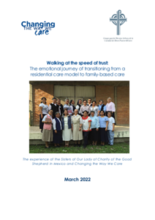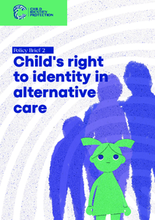Displaying 261 - 270 of 1343
Este documento brinda orientación sobre cómo aplicar los estándares internacionales cuando se trabaja con niños y sus familias afectados por esta crisis. La pregunta que se debe hacer, de manera consistente, sea cual sea la decisión, acción o proceso, es "¿qué es lo mejor para el niño?" Esto se aplica a situaciones sobre el terreno que son complejas y no permiten respuestas fáciles.
This document provides guidance on how to apply international standards when working with children and their families impacted by this crisis. The question to be asked, consistently – whatever decision, action or process – is “what is in the best interests of the child?” This applies to situations on the ground that are complex and allow no easy answers.
This rapid training was designed to provide information to Moldovan foster families in preparation for fostering unaccompanied and separated children from the Ukraine. The training package includes a PPT and facilitator’s guide. Content provided during the six-hour training program includes basic information on childhood trauma, Adverse Childhood Experiences, key elements of PFA including Look, Listen and Link, and understanding how to both identify and support children who have lived through trauma and how it might manifest at different ages and stages of development.
Migrant youth are vulnerable and face a risk of internalised disorders such as depression. This qualitative meta-synthesis explores migrant adolescents’ experience of depression.
Separation and loss characterise a child’s experience in care, yet losses in the care-experienced population have rarely been studied as a possible source of trauma or as events that may justify a grief response. A literature search of five databases yielded 592 publications. 41 full text articles were reviewed, 16 publications were included. Thematic analysis revealed: children in care are affected by two broad type of ambiguous loss, relationship losses and psychosocial losses; behaviours labelled as ‘problem’ behaviours may in fact be indicators of the manifestations of ambiguous loss and disenfranchised grief; manifold ambiguous losses associated with multiple placement moves has a cumulative effect that can generate long-term negative consequences; the effects of ambiguous loss can be offset by supporting children in care to understand that their losses may not be resolvable, to build tolerance to this ambiguity, to rebuild their identity through forging permanent connections, and to make meaning of their situations.
Este informe documenta las primeras etapas de un proceso de aprendizaje entre Cambiando la forma en que Cuidamos y la Congregación de las Hermanas de Nuestra Señora de la Caridad del Buen Pastor en México a medida que ellas avanzan en su proceso de transición. Este documento está dirigido a los profesionales, las organizaciones y los actores católicos interesados en apoyar o participar en un proceso de transición con las organizaciones católicas y también proporciona información útil para aquellos que participan en la transición con actores no religiosos. Esto incluye un importante aprendizaje relacionado con la forma de acompañar a las religiosas en el proceso de transición, comprendiendo los matices relacionados con el tiempo, el contenido y el enfoque. Y lo más importante es que explora el componente emocional que conlleva el hecho de que las religiosas, adapten el enfoque de su carisma a medida que se transforman, pasando de proporcionar atención residencial a una atención basada en la familia y la comunidad.
This brief documents the first stages of a learning process between Changing the Way We CareSM and the Mexican Province of the Congregation of the Sisters of Our Lady of Charity of the Good Shepherd as the Sisters moved forward in their transition process. It is written for practitioners and organizations, including Catholic actors interested in supporting or engaging in a transition process with women religious and also provides useful information for those engaging in transition with non-faith actors.
This article explores the role resilience processes play in education and well-being outcomes for street-connected children. It draws on research and practice undertaken as part of the Building with Bamboo Programme (BwB) on resilience. BwB investigated the forms a resilience-based approach might usefully take in practice, the effect this has on promoting resilience in children, and how this resilience leads to improved outcomes in their lives.
This policy brief aims to foster an understanding that the provision of quality alternative care, requires that the child’s right to identity is safeguarded.
This study explored perceptions of Quality Parenting Initiative's (QPI) impact on the foster parent experience, with a particular focus on foster parent involvement in implementation efforts and strengthening stakeholder relationships.


